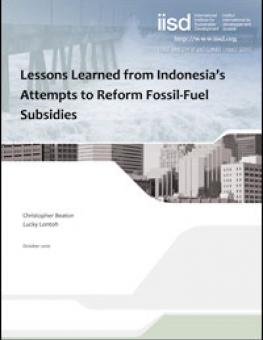
Lessons Learned from Indonesia's Attempts to Reform Fossil-Fuel Subsidies
This report, prepared by Christopher Beaton and Lucky Lontoh, examines Indonesia's attempts to reform fossil-fuel subsidies.
It reviews the history of fossil-fuel subsidies in the country and focuses on the performance of two policies that have been used to support reform. The first is the Bantuan Langsun Tunai, an unconditional cash transfer program used to help cushion low-income households from price increases in 2005 and 2008. The second program, begun in 2007, aims to make low-income households use liquified petroleum gas (LPG) instead of kerosene, as it is cheaper to subsdize, cleaner and more efficient. The report concludes that both these policies appear to have achieved the Indonesian government's objectives.
You might also be interested in
How Indonesia's Incoming President Can Advance the Transition to Clean Energy
With Prabowo Subianto inaugurated as Indonesia’s President, speculation abounds about the new administration’s commitment to the clean energy transition and climate targets, given Prabowo’s positioning as the “continuity candidate.” The question is, what, exactly, will be continued?
What the war in Ukraine means for Asia's climate goals
The queues outside petrol pumps in Sri Lanka have lessened, but not the anxiety. Asanka Sampath, a 43-year-old factory clerk, is forever vigilant. He checks his phone for messages, walks past the pump, and browses social media to see if fuel has arrived. Delays could mean being left stranded for days. "I am really fed up with this," he said. His frustrations echo that of the 22-million inhabitants of the island nation, facing its worst ever economic crisis because of heavy debts, lost tourism revenue during the pandemic, and surging costs. The consequent political turmoil culminated with the formation of a new government, but recovery has been complicated by Russia's invasion of Ukraine, and the consequent upending of global energy markets.
Curbing fuel subsidies is only the first step out of energy crisis
Indonesia’s fuel subsidies have been a recurring problem for the country’s economy. For years, they have been weighing on the state budget, providing unjust support for fossil fuels and slowing the much-awaited clean energy transition. But skyrocketing global energy prices could require the country to allocate a colossal Rp 700 trillion (US$46.6 billion) for energy subsidies this year – more than four times the budgeted amount.
Switching Fossil Fuel Subsidies in Indonesia to Support a Green Recovery
This brief looks at how Indonesia can start actively promoting renewable energy by removing the existing hurdles to its deployment—such as unattractive renewable energy feed-in tariffs and land and infrastructures barriers—and switching public support from fossil fuels to renewables to meet the country’s clean energy targets.